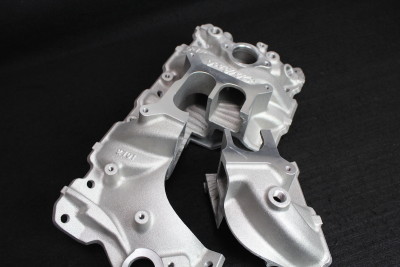CHEVY HARDCORE / POWER AUTOMEDIA

Once upon a time, motorsports ruled the roost when it came to spectator sports. Every wide-eyed teen-aged kid wanted to be the next King Richard, Big Daddy Don, or Jungle Jim. The stands were filled with these dreamers, from NHRA and NASCAR levels down to the local county fair demolition derby. Those were the good old days when burnt and unburned Nitro and Methanol filled the air.
The young people now aren’t thinking of today as the good old days but at some point they are going to. – Booth Platt
Noticeably absent are those wide-eyed high-school dreamers that would have eventually inherited motorsports and the aftermarket automotive industry as the next generation of hot rodders.
“Expense is a barricade to the younger generation in a variety of ways. A few people end up at the premiere events in motorsports but the vast majority end up NOT there. It is like the few people that end up in the NFL and the majority that don’t,” observed Booth Platt of Proform Parts.
Other leaders in the automotive industry have echoed the same concerns. “For many years now, I’ve heard that the motorsports and automotive industry was in trouble because of the lack of youth in the stands and competing,” said Aeromotive’s Vic Wood adding, “I don’t believe that for an instant. Sure the huge NHRA WinterNationals event at Pomona might not be filled with young people but if you go to other venues, especially down to the grass roots level events, you will see the youth movement in full stride.”
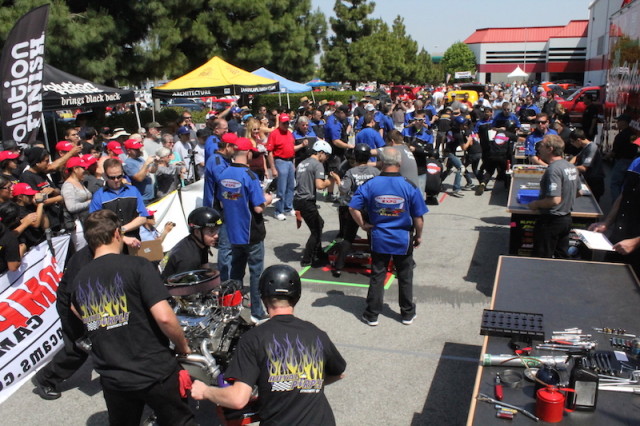
The Hot Rodders of Tomorrow Engine Challenge has brought a resurgence in high school shop programs throughout the states.
Edelbrock’s Three Tiered Approach
Edelbrock’s involvement in educating youth in the industry began innocently enough when Christi Edelbrock, a single working mother, recognized that educational institutions were struggling with providing for their pupils in an environment where the budgets were shrinking. Her own son’s after-school tutoring facility was no different.
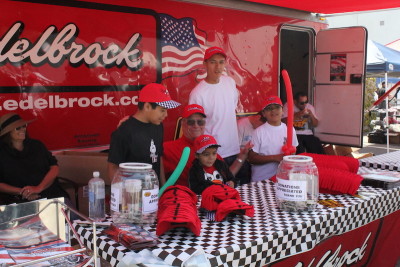
Edelbrock’s “Revved Up For Kids” charity carshow helps introduce a younger enthusiast to the industry.
The folks at Edelbrock were not going to stop with a local community fundraiser however, and shortly they joined forces with Jim and Rodney Bingham’s Hot Rodders of Tomorrow program. This group specializes in helping high-school students get a foothold in automotive education.
As high school budgets were being tightened nationwide, programs were cut from school’s curriculum. One of the hardest hit programs in the these schools is the industrial arts and shop classes. The Edelbrock corporation realized that kids would not be exposed to the auto industry and auto maintenance without some outside support. A natural partnership between Edelbrock and the Hot Rodders of Tomorrow was formed.
In very short order, the Edelbrock family foundation put the wheels into motion for an Edelbrock Performance Academy and found a willing partner in the Ohio Technical College. Launched in 2012, the Edelbrock Academy program is up and running with students already on their way to a career in the automotive industry.
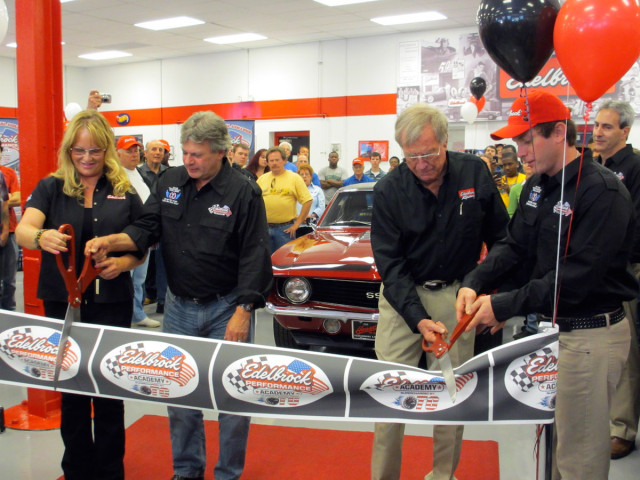
Edelbrock partnered with Ohio Technical College bringing another level of automotive education to the field with the Edelbrock Performance Academy in 2012.
At the Corporate Level
“We are approached all the time by schools with limited resources for their auto shop classes looking for support materials to help with eduction,” said Edelbrock’s Director of Advertising, Eric Blakely. “To accommodate these requests, we actually created a packet the we will send out to them that includes a cylinder head that has been cut in half, one intake manifold that has also been cut in half, several current catalogs, several carburetor installation DVDs, several Made In USA books, several hats and a banner for the shop,” Blakely added. “This packet also includes an instruction sheet for the cylinder head and intake manifold cutaway explaining the key parts of each.”
Part of Edelbrock’s corporate package for high school shop programs is a cut-away of an intake so students can see how airflow through the intake works.
Blakey went on to explain, “In the past, we have also sponsored some auto shop race vehicles with product for their builds. This isn’t something we do a lot of, but if it makes sense we will. We have also supported school’s auto shops by selling them product at a deep discount to help them complete builds.”
Edelbrock also hosts facility tours almost on a weekly basis for local Southern California programs. “This is a great chance for the youth to see all of the opportunities and jobs that are available in our industry, from sales to tech support and engineering,” Blakely said. “We have an open door policy and seldom turn anybody down.”
Starting with just five schools and 25 students just eight years ago, the group has grown to 110 teams and 770 students last year.
“The reason that we started the Hot Rodder’s of Tomorrow engine challenge was because we do have a concern. I think we are here just in time to shed some light on it. But there is still a lot of work to be done in the long term,” said Rodney Bingham, President of the Program.
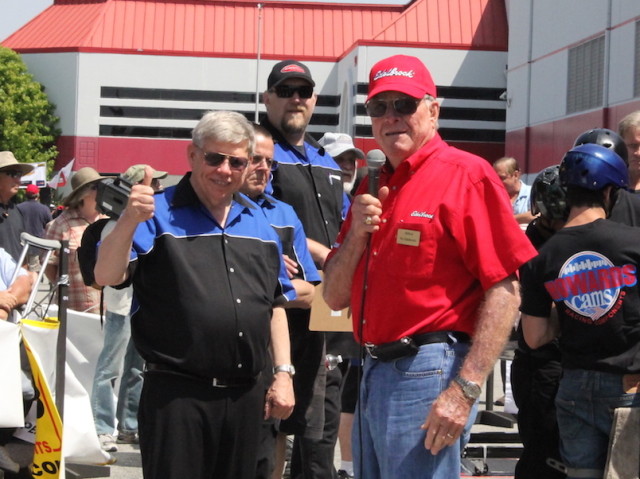
Hot Rodders of Tomorrow founder Jim Bingham (in the blue/black shirt on the left) and Vic Edelbrock Jr. (in the Edelbrock red shirt on the right), join together to bring the program to southern California.
Bingham sees a lot of positive when it comes to the question of young enthusiasts.“There are kids that love shows like Street Outlaws,” he claims. “These shows are making an impression on the youth, and I agree with the NHRA somewhat, that it’s not a good way to promote drag racing but what it does do is get these kids excited about automotive. So, it’s kind of a double edged sword but if you talk to the kids or their instructors, this is the only show where the students actually talk about stuff that is going on in the automotive world.”
When it comes to progress, Bingham also sees a lot of youth movement from the industry as well. “I’ve taken more calls in the past couple of months than I have in the past couple of years, where people are saying that we have to give these kids a hand up,” he stately flatly. “We are finally getting into these schools, seeing what the challenges that those instructors are facing and engaging these students and teaching them about automotive.”
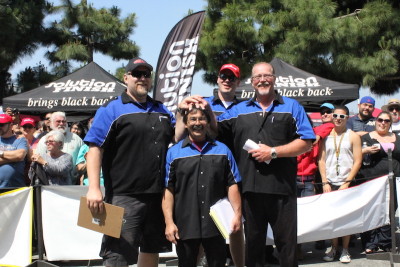
Bingham’s crew, which perform multiple duties from judging to helping evaluate high school programs, are starting to get into more schools, taking a look at the shop programs and seeing what obstacles the instructors are facing.
Bingham also notes that the automotive world has changed and the education needs to change with it. “They like other cars than we did too and that is the other part that we have to understand. Their racecars are the Hondas, Acuras and different cars than what you and I grew up seeing as actual racecars.”
Addressing these differences, Bingham explained what the future for the Hot Rodders of Tomorrow looks like. “We are working on another engine challenge, which will be an LS engine challenge,” he explained. “We are not replacing our small-block Chevy because that will always be our bread and butter. We will keep adding more and more challenges to the Hot Rodders to get more and more kids involved.”
Engines are just one part of the automobile. Granted they are one of the most glamorous parts of the car, but Bingham and his crew realize that there are many other automotive systems that could be added into their program.
“We’re looking at doing some carb challenges and some rearend challenges,” he said. “These are more than just going through the motions, they will have to know why they are doing, what they are doing.”
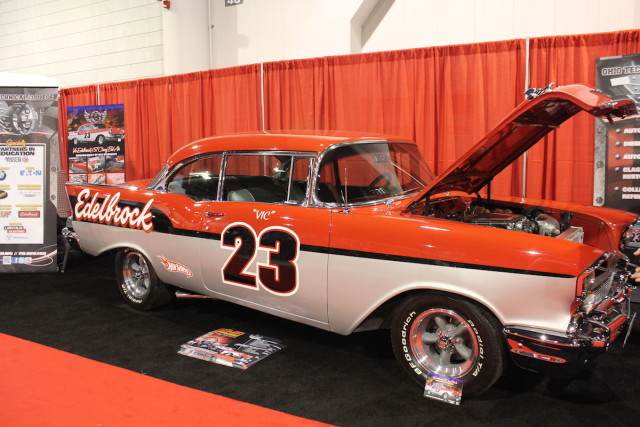
In response to Edelbrock’s support of the Ohio Technical College, students, led by faculty members, built a performance 1957 Chevy for Vic Edelbrock to represent their gratitude and the Edelbrock Academy. The customized 1957 Chevy Bel Air was the centerpiece of Ohio Technical College’s display at SEMA 2010 tradeshow and represented the Edelbrock Academy at Ohio Technical College.
The Next Level
Ohio Technical College (OTC) had a career-oriented mechanic training program in Cleveland, which was designed to offer career training programs from auto maintenance to alternative fuel vehicles. Edelbrock saw an opportunity to bring aftermarket automotive into the classroom and joined forces with the OTC when Christi Edelbrock, Vice President of Business Development at Edelbrock, and Justin Brenner, Director of Corporate Development for OTC, met at SEMA.
“Students gain an advantage in the workforce by completing the Edelbrock Performance Academy by receiving hands-on training using the latest products from Edelbrock,” said Christi Edelbrock. “This is ideal for those pursuing a career as an engine dynamometer test technician at a performance shop or other tuner positions on a unique builder, race team or at a specialty aftermarket installer.”
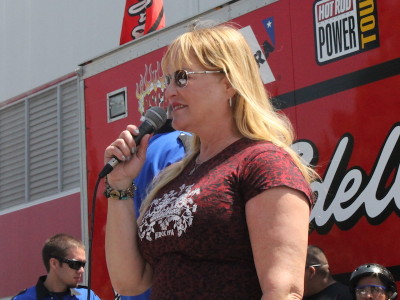
Christi Edelbrock has taken a lead role within the Edelbrock Family Foundation, helping with many educational institutions and programs that support the automotive industry.
Platt acknowledges that hands-on maintenance is important but there are other aspects of the industry that need to be learned for other avenues of entry into the industry. “If they want to get into the manufacturing side of the industry, they really need to expand their skill set at school,” He advises. “It’s cool that they understand the wrenching and engine building but there is a lot more going on here than just that. The wrenching is only one small facet of it.”
Completing The Loop
Going through the training, whether it is graduating from a high school program, Hot Rodders of Tomorrow Engine Challenge or a technical trade school, there seems to be a payback to the industry. Even those alumni with success complete the loop by working with the programs they have graduated from. “I have a big majority that have come back and started helping us judge and helping the next group of kids,” Bingham explained. “We have one kid that graduated last year and he works at a GM dealership. They allow him to take his vacation and he comes back here to help by being a judge at a couple of events.”
“I would say that 20 percent end up in our industry. The others either go on to become mechanics with a real high percentage that go on to have careers at dealerships or different lube places. We’ve had a lot of kids go on to become diesel mechanics. So many that we are going to feature it in the ‘What have they done since Hot Rodders’ program.”
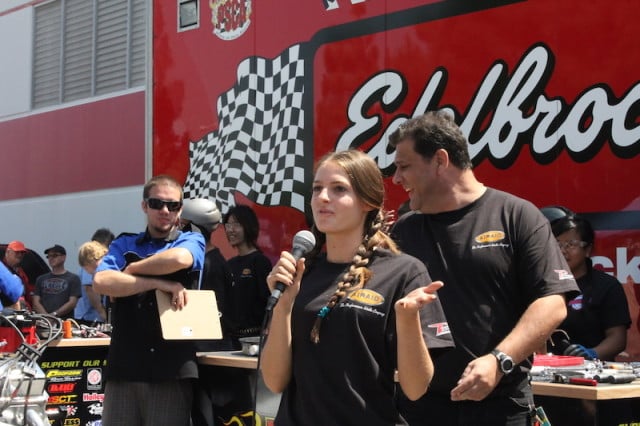
Kids that come through the Hot Rodders of Tomorrow program learn more than just maintenance. From public speaking to simple accounting, these students get a well rounded education in the automotive field. Many go on to much bigger things.
How Do You Get Involved?
With over a 110 teams involved in the Hot Rodders of Tomorrow, there is a very good chance that most of the high schools in the larger cities are covered. For those that live in an area that is not currently supported by a program, Bingham explains how they can get involved. “If they don’t have an auto shop, they can form a club.
This is something that we’ve helped kids do because some schools don’t have the budget for an auto shop program,” he explained. “They can form a club, and all they need to do is find a high school teacher that is willing to spend some time after school. They can get in touch with me and we can help them start some fund raisers and things so that they can get a program started.”
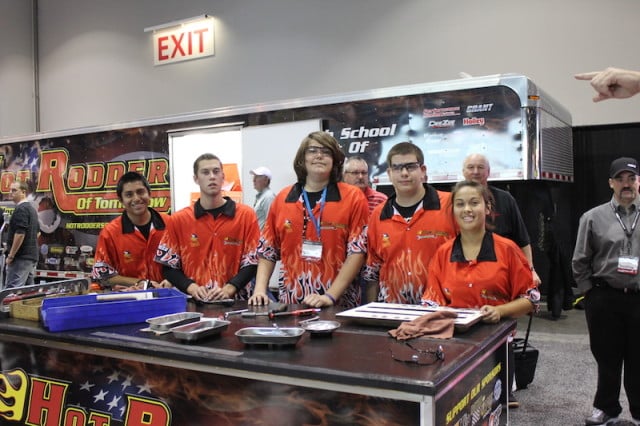
High school teams meet in various locations across the country to compete in the Hot Rodders of Tomorrow Engine Challenge competition. These youth programs, which are largely underfunded, exist because of enthusiasts passion, regardless of age.
College level students can apply directly to organizations like Ohio Technical College.
The Future of Aftermarket Automotive and Motorsports
It’s difficult to know exactly what the landscape of the automotive world will look like for the next generation, but one thing is sure. Each generation of automotive enthusiasts believes they have achieved the pinnacle of the hobby and it’s all downhill from there. After seeing the programs that are available to younger enthusiasts, it is obvious that the best is still yet to come.
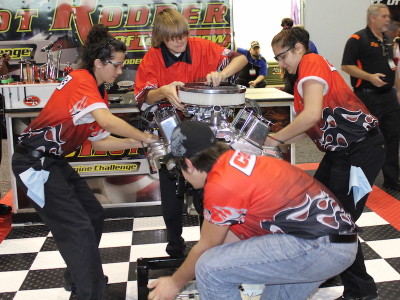
The youth movement in our industry has created a new breed of auto enthusiast that isn’t defined by gender or age, only by passion.
Judging by the positive involvement from companies already involved in the Hot Rodders of Tomorrow program, we can deduce that the future of our industry and motorsports is in good hands. Our industry and the motorsports world are not in jeopardy. We can hardly wait to see what tomorrow brings.
Sources
Phone: (800) 322-7000
Phone: (310) 781-2222



